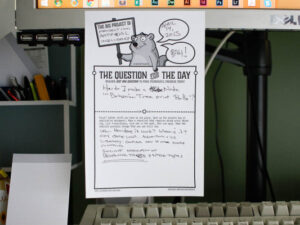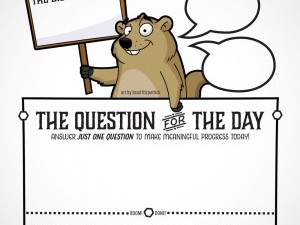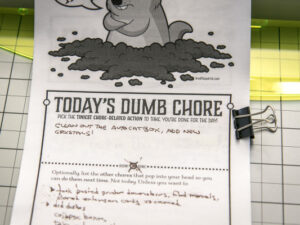(last edited on February 15, 2023 at 12:27 pm)
 Today would have been Day 12 of the Microtask Challenge, but I’m calling it a dud. While the idea of microtasks supported with specialized worksheets is cool, I am finding they don’t address the actual problem I’m trying to solve: making sustained, regular progress on my personal projects. My will to work is being sapped before microtasks have a chance to kick-in.
Today would have been Day 12 of the Microtask Challenge, but I’m calling it a dud. While the idea of microtasks supported with specialized worksheets is cool, I am finding they don’t address the actual problem I’m trying to solve: making sustained, regular progress on my personal projects. My will to work is being sapped before microtasks have a chance to kick-in.
To recape, the hypothesis behind microtasks is that any action at all, no matter how small, tends to result in sustained effort over a period of time. When working completely by myself, the challenge for me is getting over the threshold of starting. I thought that making the starting threshold ridiculously small might work, if I was able to accept that even ridiculously small tasks were worth swinging at. The psychological hurdle, I thought, was that I thought small tasks were dumb.
While the approach seemed to work for the first week for exploratory tasks, it completely failed to ignite progress on the main challenge: making progress on my game programming project.
Postmortem follows.
A Failure to Ignite
Let me start first by setting the tone for how I’m looking at this failure: it’s expected. While it would have been wonderful to proclaim to the world how awesome my idea was and prove how super-productive I am, that’s not the way we roll here at Dave’s Laboratory. Here we face the truth as best as we can, and learn from it. It’s important to acknowledge failure with confidence and even a bit of pride at having tried something different. Sure, I’m a bit disappointed that I didn’t get any meaningful work done on my programming project, but it was worth swinging at.
With that framing statement out of the way, let me summarize what I believed were the main challenges I was facing:
I hypothesized it was the size of my tasks that triggered resistance to them. In the jargon of professional goal setting, my experienced resistance was a failure to deconstruct and break my goals down into manageable chunks. I had thought I was breaking things down just fine, but perhaps they needed to be even smaller. Hence, the idea of “microtasks”: tasks SO SMALL that half the work was done if you even looked at them.
I was aware that losing focus was another contributor to my resistance. Distractions break me out of the “chain of thinking and doing” that leads to flow. By designing microtask worksheets to provide a single focus and supporting logging tools, I hoped that I would be able to more quickly return to the path of productive work when distraction inevitably occurred.
From a conceptual perspective, these two approaches are potentially useful; I may work them into an Emergent Task Planner™ supplementary form package. However, after this last week I’ve come to believe that microtask sheets are not the right tool for me right now.
The Challenge Behind the Challenge
While I have been telling myself and the world I want to be working on my cool life-enhancing personal projects, the truth is that I did not want to do the work. I find programming by myself to be tedious and boring. The very thought of jumping into a programming project sends my the squishy-feely side of my brain running off to the nearest distraction, screaming, Don’t put me in the box! Don’t make me shrink to fit inside it! My rational side sees this behavior and tut-tuts it away, confident that the projects are worthwhile and rewarding in the long term. But what it comes down to is if there is nothing coercing me to do the work, then I just won’t do it. Who does something that they don’t want to do if they don’t have to? Those would be the successful people who enjoy pushing themselves and meeting challenges of their own making. Me, not so much, if it’s just me.
Microtasks were conceived as a way to try to find motivation from within by tricking my recalcitrant squishy side into starting the work, like dragging a kid to a museum or promising cupcakes for finishing a book. I have pretty much always been like this when told to do something that is “good for me”, and apparently the same resistance applies even when I am the authority figure.
At this point, I’m going to throw up my hands and just declare that “Dave is clever but needs a strong source of external motivation to be a productive member of society.” Reviewing the past two weeks of procrastinatio might give me a clue as to what that external motivation might be:
I did work that other people needed. I resented it at a primal level, but because someone needed it I got it done. However, it got done without any sense of joy. I feel irrationally mad about it just thinking about it, perhaps because it feels like time was taken from me with nothing tangible offered in trade. I find it difficult to turn down people in true need, when the situation demands a quick tactical reponse. Although this is what people sometimes hire me for, I am tired of it.
I felt energized when talking with like-minded peers. I was in a foul mood from the number of scheduled meetings I had last week, but when I took a deep breath and shared details of life pursuits with my friends, I felt a lot better. The feeling didn’t enable productive work, but the negative feelings subsided. I thought this noteworthy, as negative feelings are a huge contributor to resistance.
I was resentful. The underlying theme of the past few weeks has been noticing just how unproductive I was being. This colored how I evaluted every meeting I had to attend, creating a conflict between my desire to act on my own behalf (but not doing so) and going to someone else’s meeting for someone else’s project. The negativity would build until the event actually happened, at which point it would disappate as I interacted with people in-person. I noted that being in the same room as people working on something together didn’t trigger resentment.
Insomnia. I had thought my weird sleeping schedule was just due to the late hours I kept; most nights I would go to sleep well after 3AM, sometimes as late as 9AM. I would then wake up in the afternoon and feel that the day had slipped away. There was one day where I just decided to get out of bed at 4AM, started working on blog-related stuff, and got a lot done before 3PM, at which point I fell asleep again. It’s like I’m a night owl by nature if I’m not getting things done. Shifting into morning mode requires more discipline, and maybe applying just that bit of discipline begets more discipline.
I clicked on EVERYTHING. There were many times when I looked right at my programming microtask, then clicked away to see what was going on with Facebook, Twitter, and the online gaming forums I have been frequenting. I binge-watched Agents of Shield and Archer, bought all manners of workflow-related crap on Amazon, and polished workflows that didn’t need polishing.
I checked a lot of social media status updates. I looked for signs that I was interacting with people. If I posted a blog post, I would check my web analytics to see if it was strikng a chord anywhere. If I left a comment on Twitter or Facebook, I would check back to see if anyone read or liked it. This suggests that I am craving connection. I usually don’t check blog stats or count “likes”, but this month I’ve been paying more attention to it. This may not entirely be related to avoiding microtasks itself, since I’ve been thinking about what the blog “is”, and what it “might be to whom”.
As I review the above list, the negative feelings and resentment stand out to me. I don’t want to be a resentful person, but my thoughts turn that direction when distracted by other people’s needs. This is at odds with the desire to connect with some kind of tribe of my peers. Even when I am binge-watching Deadwood or playing Wildstar, I’m looking to connect with characters and their stories. I guess the easy label to apply would be depression. I’m not that excited about doing a lot of programming work, and I don’t want to take responsibility for other people’s problems, so the result is escapist behavior. My brain is seeking something that feels like connection, I think.
I find this very interesting. At the moment of this writing, my heart is paralyzed by relationships with people. On one hand, I want to be left alone by people and their demands. On the other hand, I want to connect with people. I want to be left alone because I perceive people as a threat to the sanctity of my time. However, I apparently also want and even need to be around people, because I crave warmth and a sense of purpose that is shared.
Pause before Deciding Next Steps
I’m not going to make a decision about what to do next exactly, but at least I think I have a good handle on what’s been bothering me. I have always been a bit neurotic around people. Can’t live with ’em, can’t live without ’em! Before I sign-off on this post, I’ll brain-dump a pro-con list about people and see what comes out.
What I like about people – Hearing about their dreams and what they’re doing about them. Hearing true stories. Seeing people can lose themselves in a topic to the point where you can see the truth in the heart. Sharing tips. Talking shop. Celebrating personal victories. Collective ambition. Desire to learn, practice, challenge, and chase.
What I don’t like about some people – Doing the work for someone who should know better. Being held hostage by someone else’s bad leadership. People who are unwilling to look at difficult topics. Failure to recognize limits of own competence. People who hide their motivations. Sense of unearned entitlement. Satisfaction with status quo. Hidden agendas. Putting their interests over others, manipulatively. People who abuse power. People who don’t take responsibility. People who ask but do not reciprocate. People who bring others down to feel better about themselves. Inability or lack of desire to know their own motivations. People who assume that if you are not with them, you are against them. People who don’t listen to what you’re saying.
As I look at that list, I feel that I am sort of terrible person for thinking this way, and wish I didn’t. I apparently have some internal work to do. On the other hand, it’s perfectly allowed to have personal beliefs. What I worry about is letting the negative feelings influence how I deal with individuals. What I’m describing above are generalizations, and I would be a huge ass if I were to assume less than the best of new people that I meet. Maybe this is why I find interacting with people so exhausting.
Anyway, I’m going to let this stew for a while, and try to come up with another course of action on Monday.
About this Article Series
This is part of a month-long challenge to see if I can make something small every day to learn patience. The April 2015 Challenge Page lists everything in one place...check it out!






0 Comments